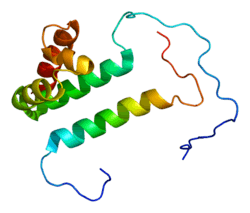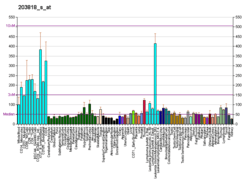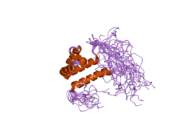SF3A3
Splicing factor 3A subunit 3 is a protein that in humans is encoded by the SF3A3 gene.[5][6][7]
This gene encodes subunit 3 of the splicing factor 3a protein complex. The splicing factor 3a heterotrimer includes subunits 1, 2 and 3 and is necessary for the in vitro conversion of 15S U2 snRNP into an active 17S particle that performs pre-mRNA splicing. Subunit 3 interacts with subunit 1 through its amino-terminus while the zinc finger domain of subunit 3 plays a role in its binding to the 15S U2 snRNP. This gene has a pseudogene on chromosome 20.[7]
Interactions
SF3A3 has been shown to interact with SF3A1.[6][8]
gollark: I'm sure you have lots of evidence of other alien species around to back that up.
gollark: https://media.discordapp.net/attachments/549759333014044673/808471722385735680/unknown.png?width=421&height=422
gollark: No, that is utterly wrong. It's not in order.
gollark: Actually, YYYY-MM-DD is ISO 8601 and thus superior in all ways.
gollark: https://pbs.twimg.com/media/Es8yBStXMAECSe3?format=jpg&name=900x900
References
- GRCh38: Ensembl release 89: ENSG00000183431 - Ensembl, May 2017
- GRCm38: Ensembl release 89: ENSMUSG00000028902 - Ensembl, May 2017
- "Human PubMed Reference:". National Center for Biotechnology Information, U.S. National Library of Medicine.
- "Mouse PubMed Reference:". National Center for Biotechnology Information, U.S. National Library of Medicine.
- Kramer A; Legrain P; Mulhauser F; Groning K; Brosi R; Bilbe G (February 1995). "Splicing factor SF3a60 is the mammalian homologue of PRP9 of S.cerevisiae: the conserved zinc finger-like motif is functionally exchangeable in vivo". Nucleic Acids Res. 22 (24): 5223–8. doi:10.1093/nar/22.24.5223. PMC 332064. PMID 7816610.
- Chiara MD; Champion-Arnaud P; Buvoli M; Nadal-Ginard B; Reed R (August 1994). "Specific protein-protein interactions between the essential mammalian spliceosome-associated proteins SAP 61 and SAP 114". Proc Natl Acad Sci U S A. 91 (14): 6403–7. Bibcode:1994PNAS...91.6403C. doi:10.1073/pnas.91.14.6403. PMC 44210. PMID 8022796.
- "Entrez Gene: SF3A3 splicing factor 3a, subunit 3, 60kDa".
- Nesic, D; Krämer A (October 2001). "Domains in human splicing factors SF3a60 and SF3a66 required for binding to SF3a120, assembly of the 17S U2 snRNP, and prespliceosome formation". Mol. Cell. Biol. United States. 21 (19): 6406–17. doi:10.1128/MCB.21.19.6406-6417.2001. ISSN 0270-7306. PMC 99788. PMID 11533230.
Further reading
- Maruyama K; Sugano S (1994). "Oligo-capping: a simple method to replace the cap structure of eukaryotic mRNAs with oligoribonucleotides". Gene. 138 (1–2): 171–4. doi:10.1016/0378-1119(94)90802-8. PMID 8125298.
- Bonaldo MF; Lennon G; Soares MB (1997). "Normalization and subtraction: two approaches to facilitate gene discovery". Genome Res. 6 (9): 791–806. doi:10.1101/gr.6.9.791. PMID 8889548.
- Suzuki Y, Yoshitomo-Nakagawa K, Maruyama K, et al. (1997). "Construction and characterization of a full length-enriched and a 5'-end-enriched cDNA library". Gene. 200 (1–2): 149–56. doi:10.1016/S0378-1119(97)00411-3. PMID 9373149.
- Neubauer G, King A, Rappsilber J, et al. (1998). "Mass spectrometry and EST-database searching allows characterization of the multi-protein spliceosome complex". Nat. Genet. 20 (1): 46–50. doi:10.1038/1700. PMID 9731529.
- Das R; Zhou Z; Reed R (2000). "Functional association of U2 snRNP with the ATP-independent spliceosomal complex E". Mol. Cell. 5 (5): 779–87. doi:10.1016/S1097-2765(00)80318-4. PMID 10882114.
- Will CL, Schneider C, MacMillan AM, et al. (2001). "A novel U2 and U11/U12 snRNP protein that associates with the pre-mRNA branch site". EMBO J. 20 (16): 4536–46. doi:10.1093/emboj/20.16.4536. PMC 125580. PMID 11500380.
- Nesic D; Krämer A (2001). "Domains in human splicing factors SF3a60 and SF3a66 required for binding to SF3a120, assembly of the 17S U2 snRNP, and prespliceosome formation". Mol. Cell. Biol. 21 (19): 6406–17. doi:10.1128/MCB.21.19.6406-6417.2001. PMC 99788. PMID 11533230.
- Jurica MS, Licklider LJ, Gygi SR, et al. (2002). "Purification and characterization of native spliceosomes suitable for three-dimensional structural analysis". RNA. 8 (4): 426–39. doi:10.1017/S1355838202021088. PMC 1370266. PMID 11991638.
- Will CL, Urlaub H, Achsel T, et al. (2002). "Characterization of novel SF3b and 17S U2 snRNP proteins, including a human Prp5p homologue and an SF3b DEAD-box protein". EMBO J. 21 (18): 4978–88. doi:10.1093/emboj/cdf480. PMC 126279. PMID 12234937.
- Strausberg RL, Feingold EA, Grouse LH, et al. (2003). "Generation and initial analysis of more than 15,000 full-length human and mouse cDNA sequences". Proc. Natl. Acad. Sci. U.S.A. 99 (26): 16899–903. Bibcode:2002PNAS...9916899M. doi:10.1073/pnas.242603899. PMC 139241. PMID 12477932.
- Dubois T; Zemlickova E; Howell S; Aitken A (2003). "Centaurin-alpha 1 associates in vitro and in vivo with nucleolin". Biochem. Biophys. Res. Commun. 301 (2): 502–8. doi:10.1016/S0006-291X(02)03010-3. PMID 12565890.
- Li J, Hawkins IC, Harvey CD, et al. (2003). "Regulation of alternative splicing by SRrp86 and its interacting proteins". Mol. Cell. Biol. 23 (21): 7437–47. doi:10.1128/MCB.23.21.7437-7447.2003. PMC 207616. PMID 14559993.
- Nesic D; Tanackovic G; Krämer A (2005). "A role for Cajal bodies in the final steps of U2 snRNP biogenesis". J. Cell Sci. 117 (Pt 19): 4423–33. doi:10.1242/jcs.01308. PMID 15316075.
- Lin KT; Lu RM; Tarn WY (2004). "The WW domain-containing proteins interact with the early spliceosome and participate in pre-mRNA splicing in vivo". Mol. Cell. Biol. 24 (20): 9176–85. doi:10.1128/MCB.24.20.9176-9185.2004. PMC 517884. PMID 15456888.
- Gerhard DS, Wagner L, Feingold EA, et al. (2004). "The status, quality, and expansion of the NIH full-length cDNA project: the Mammalian Gene Collection (MGC)". Genome Res. 14 (10B): 2121–7. doi:10.1101/gr.2596504. PMC 528928. PMID 15489334.
- Rush J, Moritz A, Lee KA, et al. (2005). "Immunoaffinity profiling of tyrosine phosphorylation in cancer cells". Nat. Biotechnol. 23 (1): 94–101. doi:10.1038/nbt1046. PMID 15592455.
- Andersen JS, Lam YW, Leung AK, et al. (2005). "Nucleolar proteome dynamics". Nature. 433 (7021): 77–83. Bibcode:2005Natur.433...77A. doi:10.1038/nature03207. PMID 15635413.
- Tanackovic G; Krämer A (2005). "Human splicing factor SF3a, but not SF1, is essential for pre-mRNA splicing in vivo". Mol. Biol. Cell. 16 (3): 1366–77. doi:10.1091/mbc.E04-11-1034. PMC 551499. PMID 15647371.
This article is issued from Wikipedia. The text is licensed under Creative Commons - Attribution - Sharealike. Additional terms may apply for the media files.






